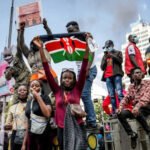Médecins Sans Frontières (MSF), also known as Doctors without Borders, has announced the close of its operations in Nizi and Bambu towns in the Democratic Republic of the Congo due to a lack of security guarantees in the country.
The humanitarian organisation is closing its operations in the towns nearly five months after a convoy of vehicles belonging to it came under fire by unidentified armed men in Ituri province.
MSF called on all parties to the conflict in the country to condemn the attack and respect international humanitarian laws.
A recent surge in armed conflict and violence in the Ituri province has worsened the humanitarian crisis in the country, as numerous reports of human rights violations, especially against women and girls, are on the rise.
There have been nearly 175 violations since January 2021, according to the United Nations Children’s Emergency Fund (UNICEF), including cases of recruitment of children into armed groups, killings and maiming of children, sexual violence and attacks on schools and hospitals.
In response to these challenges, MSF began working in Nizi and Bambu in 2018, providing medical services to some 471,000 people with a focus on paediatric health care.
However, its convoy of vehicles was attacked on 28 October, 2021, on the road between kobu and Bambu, leaving two MSF staff severely wounded.
The attack in October 2021 was not the only recent incident to impact MSF teams in Ituri province. In June 2021, the main referral hospital in Boga town, which was supported by MSF, was severely damaged during fighting in the town.
At least 12 people lost their lives, while several buildings, including the intensive care unit, were burnt down, and the hospital’s pharmacy and stocks of medical supplies were looted.
‘We are concerned by the numerous attacks and looting of health facilities and we are deeply disturbed by the climate of impunity that reigns today in this part of DRC. We know that impunity fuels yet more violence’, MSF Head of Mission, Jérome Alin, said.
MSF says it will continue to provide medical and humanitarian aid elsewhere in Ituri province, including Drodro and Angumu.
Source: MSF
Photo source: MSF






